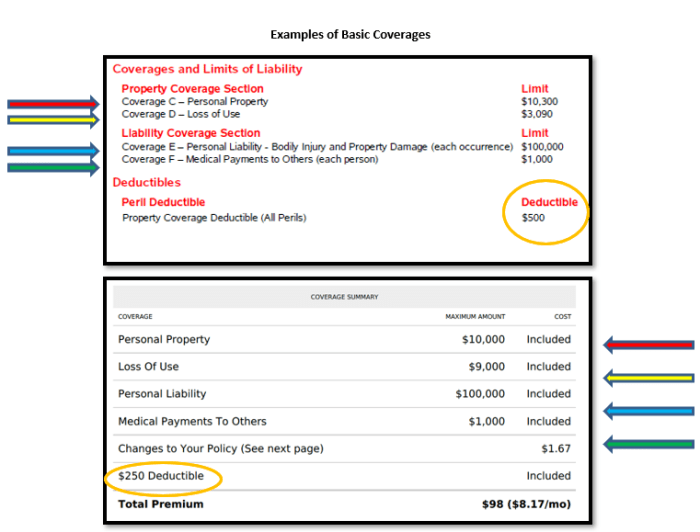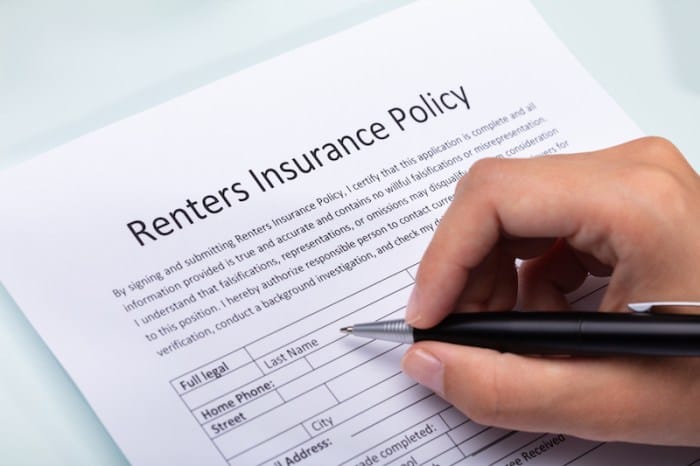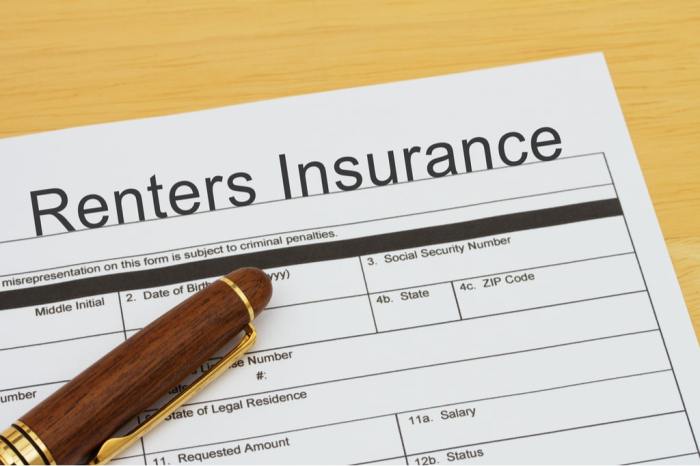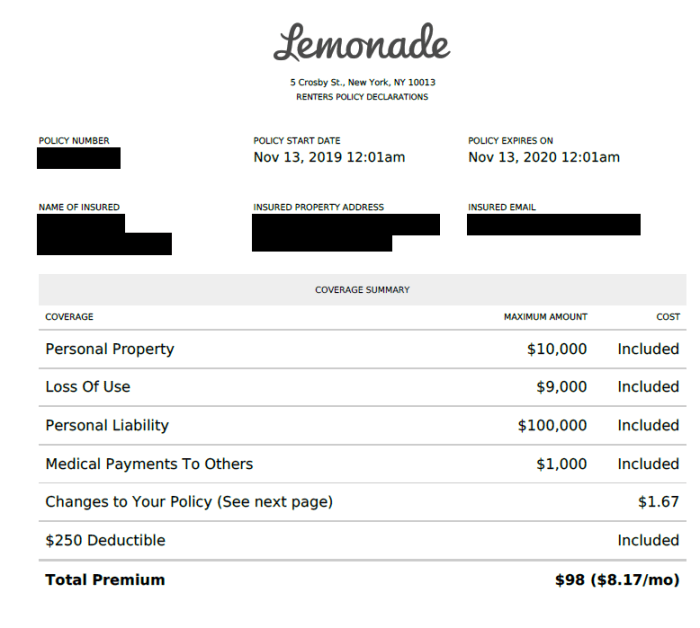Life is full of surprises, and not all of them are pleasant. When disaster strikes and your belongings are damaged or lost, having renters insurance can be a lifesaver. However, filing a renters insurance claim can be a daunting task.
This comprehensive guide will equip you with the knowledge and strategies to navigate the claims process smoothly and maximize your chances of a successful outcome.
From understanding your policy coverage to communicating effectively with your insurance company, we’ll cover every step of the claims process. Learn how to gather essential documentation, document your loss, and negotiate a fair settlement. By following these tips, you’ll be well-prepared to file a renters insurance claim with confidence.
Claim Filing Process
Filing a renters insurance claim can seem daunting, but it’s crucial to act quickly to ensure a smooth process. Follow these steps to navigate the claim filing process efficiently:
As soon as you discover a covered loss, contact your insurance company immediately. Most insurance companies have 24/7 customer service hotlines or online portals where you can report your claim.
Document the Damage
Take photos or videos of the damaged property and the surrounding area. These visual records will help the insurance adjuster assess the extent of the damage.
Gather Necessary Documentation
- Policy Number: Have your renters insurance policy number ready when you contact the insurance company.
- Proof of Loss: Provide receipts, estimates, or other documentation that proves the value of the damaged or lost property.
- Contact Information: Share your contact information, including your address, phone number, and email address, so the insurance company can reach you easily.
Submit the Claim
Once you have gathered all the necessary documentation, submit your claim to the insurance company. You can do this online, through the mail, or over the phone.
Documentation Required
Gathering the necessary documentation before filing a renters insurance claim is crucial to ensure a smooth and successful process. These documents provide evidence to support your claim and help the insurance company assess the extent of your losses.
The specific documents required may vary depending on the insurance company and the nature of your claim. However, some essential documents that are typically needed include:
Policy Information
- Insurance policy number: This unique identifier helps the insurance company locate your policy and verify your coverage.
- Policy declaration page: This document provides a summary of your coverage, including the policy limits, deductibles, and covered perils.
Proof of Loss
- Police report: If your claim involves theft, vandalism, or other criminal activity, a police report is necessary to document the incident and provide evidence of the loss.
- Itemized list of damaged or stolen property: Create a detailed list of the items that were damaged or stolen, including a description of each item, its estimated value, and any supporting documentation such as receipts or photos.
- Photographs of the damage: Take clear and detailed photographs of the damaged property to provide visual evidence of the loss. Be sure to include photos of the overall damage, as well as close-ups of specific items.
Receipts and Estimates
- Receipts for repairs or replacements: If you have already made repairs or replaced damaged items, keep the receipts as proof of the expenses incurred.
- Estimates for repairs or replacements: If you have not yet made repairs or replacements, obtain estimates from qualified professionals to provide an estimate of the cost of repairs or replacements.
Other Supporting Documents
- Lease agreement: A copy of your lease agreement may be required to verify your residency and the extent of your coverage.
- Proof of ownership: Provide documentation that proves your ownership of the damaged or stolen property, such as receipts, purchase orders, or warranties.
- Contact information for witnesses: If there were any witnesses to the incident that led to your claim, provide their contact information so that the insurance company can reach out to them if necessary.
Evidence of Loss
Substantiating your claim with solid evidence is pivotal in the claim filing process. This section delves into the significance of providing evidence and offers practical tips to effectively document your loss.
The onus lies on you to demonstrate the occurrence of the loss or damage and its extent. Hence, meticulously documenting the incident is paramount. This includes taking photographs, preserving receipts, and obtaining estimates for repairs or replacements.
Photographs
Visual documentation is invaluable in conveying the extent of damage or loss. Take clear and detailed photographs of the damaged items, ensuring to capture multiple angles and close-ups. If the loss is extensive, consider taking a video walkthrough of the affected area.
Receipts
Receipts serve as tangible proof of your ownership of the damaged items. They also provide a record of the purchase price, which is crucial for determining the claim amount. Keep all receipts related to the damaged items, including those for repairs or replacements made before the loss occurred.
Estimates for Repairs or Replacements
Obtaining estimates for repairs or replacements from qualified professionals adds credibility to your claim. These estimates should be detailed and specific, outlining the necessary repairs or replacements and the associated costs. Ensure that the estimates are from reputable contractors or vendors.
Communication with Insurance Company

Effective communication with your insurance company is crucial throughout the claims process. Maintaining open lines of communication will ensure a smooth and efficient resolution of your claim.
To communicate effectively, keep these guidelines in mind:
Be Clear and Concise
- Clearly explain the details of your claim, including the date and time of the incident, the cause of damage, and the extent of the loss.
- Use clear and concise language, avoiding jargon or technical terms that may not be familiar to the insurance adjuster.
Be Responsive
- Respond promptly to requests for information or documentation from the insurance company.
- Provide all the necessary information and documentation to support your claim in a timely manner.
Be Cooperative
- Cooperate with the insurance company’s investigation of your claim.
- Be available for inspections or interviews as requested by the insurance adjuster.
Keep Records of Communication
- Maintain a record of all communication with the insurance company, including phone calls, emails, and letters.
- Keep copies of all documents and correspondence related to your claim.
Understanding Policy Coverage

Before submitting a renters insurance claim, it’s crucial to have a clear understanding of your policy coverage. This knowledge empowers you to navigate the claims process effectively and efficiently.
Review your policy thoroughly to grasp the perils covered, exclusions, and coverage limits. This comprehensive understanding ensures you know what’s covered and what’s not, preventing potential surprises or disappointments during the claims process.
Covered Perils
- Identify the specific perils or events covered under your renters insurance policy, such as fire, theft, vandalism, or water damage.
- Familiarize yourself with the policy’s definitions of these perils to ensure you understand the circumstances under which they apply.
Exclusions
- Be aware of the exclusions listed in your policy, which Artikel situations or circumstances not covered by your insurance.
- Common exclusions include damage caused by earthquakes, floods, or acts of war. Understanding these exclusions helps you manage expectations and avoid filing claims for uncovered events.
Coverage Limits
- Determine the coverage limits specified in your policy, which set the maximum amount your insurance company will pay for covered losses.
- These limits vary depending on the type of property and the level of coverage you selected. Knowing your coverage limits helps you assess whether your policy provides adequate protection for your belongings.
Claim Timeline and Expectations

When filing a renters insurance claim, it’s crucial to set realistic expectations regarding the timeline and process. The claim settlement process can vary depending on the complexity of the claim, the insurance company’s procedures, and external factors. Understanding these factors can help renters navigate the process smoothly and effectively.
Factors Influencing Claim Timeline
- Complexity of the Claim: Claims involving extensive damage or multiple items may require a longer assessment and settlement process compared to simpler claims.
- Insurance Company’s Procedures: Each insurance company has its own claims handling procedures and protocols. Some companies may have streamlined processes that expedite the settlement, while others may have more extensive review and investigation requirements.
- External Factors: Factors beyond the control of the insurance company or the renter, such as natural disasters or supply chain disruptions, can impact the claim timeline. These events may lead to increased claim volumes and delays in processing.
Dealing with Adjusters

When filing a renters insurance claim, you’ll likely interact with an insurance adjuster. Adjusters play a crucial role in evaluating your claim and determining the amount of coverage you’re entitled to. Effective communication with the adjuster can help ensure a smooth and successful claims process.
Here are some tips for dealing with insurance adjusters:
Be Prepared
- Before contacting the adjuster, gather all relevant documents, including your insurance policy, a list of damaged or lost items, and receipts or estimates for repairs or replacements.
- Take photos or videos of the damage to support your claim.
Be Polite and Cooperative
- Remember that the adjuster is there to help you, not to hinder you. Be polite and cooperative throughout the process.
- Provide the adjuster with all the information and documentation they request promptly.
Be Clear and Concise
- When communicating with the adjuster, be clear and concise. Explain the details of your claim accurately and provide any additional information that may be relevant.
- Avoid using jargon or technical terms that the adjuster may not understand.
Be Patient
- The claims process can take time, so be patient. Don’t expect the adjuster to resolve your claim immediately.
- If you have any questions or concerns, contact the adjuster for clarification.
Review the Settlement Offer Carefully
- Once the adjuster has evaluated your claim, they will present you with a settlement offer. Review the offer carefully before accepting it.
- If you have any questions or concerns about the offer, discuss them with the adjuster before making a decision.
Negotiating the Settlement

After submitting your claim and providing the necessary documentation, you may receive a settlement offer from your insurance company. However, it’s important to remember that this initial offer may not always reflect the full extent of your losses.
In many cases, you can negotiate with the insurance company to reach a fair settlement that more accurately reflects the value of your covered losses. Here are some strategies to help you negotiate a successful settlement:
Research and Document Your Losses
Before you begin negotiations, take the time to thoroughly research and document your losses. This includes gathering receipts, invoices, and other documentation that supports the value of your damaged or lost property. You should also take photos or videos of the damage to provide visual evidence.
Present a Strong Case
When negotiating with the insurance company, it’s important to present a strong case for your claim. This means providing clear and concise documentation of your losses, as well as any relevant evidence that supports your claim. You should also be prepared to answer any questions that the insurance company may have about your claim.
Be Prepared to Provide Additional Documentation
In some cases, the insurance company may request additional documentation or information to support your claim. It’s important to be prepared to provide this information promptly, as it can help to expedite the settlement process.
Be Patient and Persistent
Negotiating a settlement with an insurance company can take time and patience. It’s important to be persistent and not give up if the initial offer is not satisfactory. By following these strategies, you can increase your chances of reaching a fair and satisfactory settlement.
Preventing Claim Denials

To ensure a smooth and successful claim process, it’s crucial for renters to understand common reasons for claim denials and take proactive steps to avoid them. Honesty and accuracy are of utmost importance throughout the claim filing process.
Common Reasons for Claim Denials
- Misrepresentation or Fraud: Providing false or misleading information during the claim filing process can lead to denial. Always be honest and accurate when describing the cause of loss and the extent of damages.
- Policy Exclusions: Carefully review your renters insurance policy to understand what’s covered and what’s not. Some common exclusions include damage caused by earthquakes, floods, or acts of war.
- Insufficient Documentation: Failing to provide adequate documentation to support your claim can result in denial. Keep receipts, photos, and other records of your belongings and their value.
- Late Filing: Most renters insurance policies have a time limit for filing claims. Failure to file within the specified timeframe can lead to denial.
Tips to Avoid Claim Denials
- Read Your Policy Carefully: Familiarize yourself with the terms and conditions of your renters insurance policy, including coverage limits, exclusions, and claim filing procedures.
- Keep Accurate Records: Maintain a detailed inventory of your belongings, including photos, receipts, and appraisals. This will help you provide accurate information when filing a claim.
- File Your Claim Promptly: Don’t delay filing your claim. Contact your insurance company as soon as possible after a covered loss occurs.
- Be Honest and Accurate: Provide complete and accurate information when filing your claim. Misrepresentation or fraud can lead to denial.
- Cooperate with the Insurance Company: Respond promptly to requests for information or documentation from your insurance company. Failure to cooperate can delay or even deny your claim.
Additional Resources and Support

Navigating the claims process alone can be challenging. Several resources and organizations are available to provide renters with assistance, guidance, and support during this time.
These resources can help renters understand their rights, ensure a smooth claims process, and advocate for a fair settlement.
Contact Information for Support Organizations
- National Association of Insurance Commissioners (NAIC): 1-866-434-9242
- Insurance Information Institute (III): 1-800-331-9146
- Consumer Federation of America (CFA): 1-202-737-9600
- National Consumer Law Center (NCLC): 1-617-542-8010
- Federal Emergency Management Agency (FEMA): 1-800-621-3362
Online Resources for Support
- NAIC’s website: www.naic.org
- III’s website: www.iii.org
- CFA’s website: www.consumerfed.org
- NCLC’s website: www.nclc.org
- FEMA’s website: www.fema.gov
Local Resources for Support
In addition to national organizations, local resources may be available to provide renters with assistance during the claims process. These resources may include:
- Local consumer protection agencies
- Legal aid societies
- Community organizations
- State insurance departments
Summary

Remember, filing a renters insurance claim doesn’t have to be an overwhelming experience. By following the steps Artikeld in this guide, you can increase your chances of a successful claim and get the compensation you deserve. Stay organized, communicate clearly, and don’t hesitate to seek assistance if needed.
With the right approach, you can navigate the claims process and get back on your feet quickly.
Common Queries
What is the most important thing to remember when filing a renters insurance claim?
Honesty and accuracy are paramount. Providing false or misleading information can jeopardize your claim.
How long does it typically take to settle a renters insurance claim?
The claim settlement timeline can vary depending on the complexity of the claim and the insurance company’s procedures. It’s essential to be patient and persistent throughout the process.
What should I do if my claim is denied?
If your claim is denied, carefully review the denial letter and understand the reasons provided. You may consider filing an appeal or seeking legal advice if you believe the denial is unfair.



